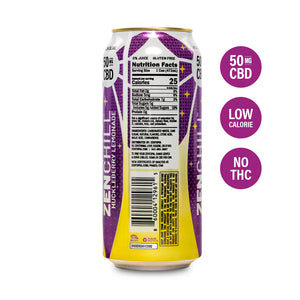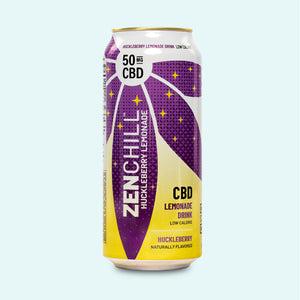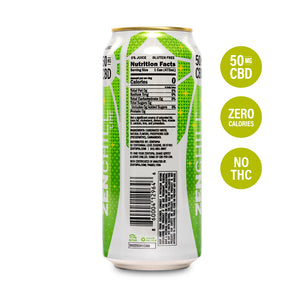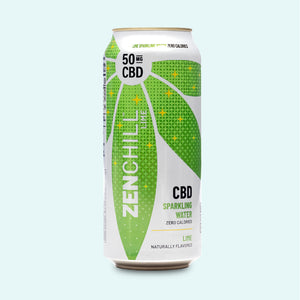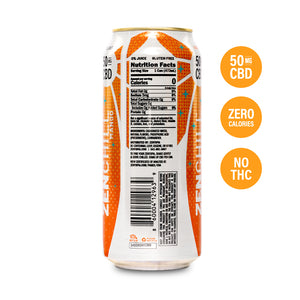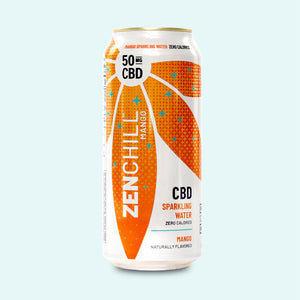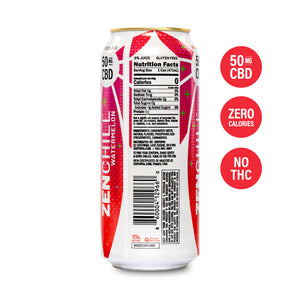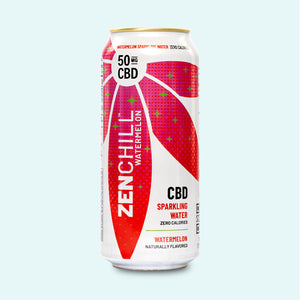
Traveling with CBD: What You Need to Know
In recent years, the use of CBD products has skyrocketed, driven by their positive health benefits and versatility. For travelers, CBD can be a game-changer, offering relief from anxiety, pain, and sleep disturbances often associated with travel. However, navigating the legal landscape and practicalities of traveling with CBD can seem a bit daunting. This CBD travel guide aims to answer all your questions about traveling with CBD, ensuring you are well-prepared for your next trip. Whether you're a frequent flyer or planning a much-needed vacation, Zentopia's assortment of CBD drinks provides a convenient and enjoyable way to manage travel stress and enhance your overall experience.
What is CBD?
Understanding CBD
CBD, or Cannabidiol, is a naturally occurring compound found in the cannabis plant. Unlike THC (tetrahydrocannabinol), the psychoactive component of cannabis, CBD does not produce a "high." This makes it an attractive option for those seeking therapeutic benefits without the mind-altering effects of marijuana.
CBD is found in all cannabis plants to some degree, but the highest concentrations are in hemp. The CBD products you find in stores or can order online from companies like Zentopia are legally derived from industrial hemp. This form of CBD is legal in almost every state because hemp contains less than 0.3 percent THC, making it non-psychoactive.
- Origin and Extraction: CBD is extracted from the leaves and flowers of either hemp or non-hemp plants. The extraction process can involve CO2 or ethanol to ensure a pure and effective product.
- Legal Status: In the United States, the 2018 Farm Bill legalized the production and sale of hemp-derived CBD products containing less than 0.3% THC. However, state laws can vary significantly, so it's crucial to check local regulations.
- Forms of CBD: CBD is available in various forms, including oils, tinctures, capsules, edibles, and beverages. Zentopia offers a range of CBD drinks that provide a convenient and tasty way to consume CBD.
Benefits of CBD
CBD is renowned for its positive health benefits, making it especially appealing to travelers.
- Anxiety Relief: CBD can help reduce anxiety levels, which is particularly beneficial for those who experience travel-related stress or fear of flying.
- Pain Management: CBD's anti-inflammatory properties can alleviate pain and discomfort from prolonged sitting or other travel-related aches.
- Sleep Improvement: Many travelers struggle with sleep disturbances due to time zone changes or uncomfortable sleeping conditions. CBD can promote better sleep quality, helping travelers feel more rested.
Travelers might use CBD to manage conditions such as:
- Flying Anxiety: CBD can provide a calming effect, reducing the stress and anxiety associated with air travel.
- Jet Lag: CBD may help regulate sleep patterns and mitigate the effects of jet lag.
- Muscle Aches: Long flights or car rides can lead to muscle stiffness and pain, which CBD can help relieve.
Legal Considerations for Traveling with CBD
CBD Legality in the United States
The legality of CBD in the United States can be complex due to varying federal and state regulations.
- Federal Law: The 2018 Farm Bill legalized hemp-derived CBD products containing less than 0.3% THC at the federal level. This legislation removed hemp from the Controlled Substances Act, distinguishing it from marijuana.
- State Laws: Despite federal legalization, some states have more stringent laws regarding CBD and individual states can impose stricter regulations.
So you may be asking “in what states is CBD illegal?” Don’t worry, we’ve got you covered. Check out the list below for a breakdown of states where CBD is legal and illegal.
Cannabis Legality Status by State:
- Alabama - Conditionally Legal:
- CBD oil exceeding 0.3% THC is legal with a medical cannabis license for specific conditions
- Alaska - Fully Legal
- Arizona - Fully Legal
- Arkansas - Conditionally Legal:
- Cannabis-derived CBD oil exceeding 0.3% THC is legal with a medical cannabis license for specific conditions
- California - Fully Legal:
- Hemp-derived CBD edibles are not legal in the state, but cannabis-derived CBD edibles are; it doesn’t seem to be strictly enforced and legislation has been proposed to remove this restriction
- Colorado - Fully Legal
- Connecticut - Fully Legal
- Delaware - Conditionally Legal:
- Cannabis-derived CBD oil is legal for both adults and minors under 18 with a medical cannabis license
- District of Columbia - Fully Legal
- Florida - Conditionally Legal:
- Only hemp-derived CBD products under 0.3% THC content are considered legal
- Georgia - Conditionally Legal:
- Cannabis-derived CBD oil is legal with medical cannabis license for specific conditions; must contain equal amounts of THC and CBD, and THC content cannot exceed 5%
- Hawaii - Conditionally Legal:
- Hemp-derived CBD oil is considered legal; cannabis-derived CBD oil is regulated for use exclusively by residents with a medical cannabis license
- Idaho - Conditionally Legal:
- All varieties are legal so long as there is no traceable THC content
- Illinois - Fully Legal
- Indiana - Conditionally Legal:
- All varieties are legal so long as they do not exceed 0.3% THC
- Iowa - Conditionally Legal:
- Cannabis-derived CBD oil exceeding 0.3% THC is legal with a medical cannabis license; the list of accepted conditions is fairly restrictive
- Kansas - Conditionally Legal:
- All varieties are legal so long as there is no traceable THC content; medical CBD oil is legal with a license for specific conditions, provided the THC content doesn’t exceed 5%
- Kentucky - Conditionally Legal:
- Hemp-derived CBD oil only
- Louisiana - Conditionally Legal:
- Cannabis-derived CBD oil is legal with a medical cannabis license, and any product containing more than 0.5 milligrams of THC must be declared for "adult use" on the label
- Maine - Fully Legal
- Maryland - Conditionally Legal:
- Cannabis- and hemp-derived CBD oil are now legal, but vendors may require consumers to be at least 21 years old to purchase
- Massachusetts - Fully Legal:
- Oil with THC content exceeding 0.3% is Fully Legal for adults age 21 and up and for adults 18 to 20 years old with medical cannabis license
- Michigan - Fully Legal
- Minnesota - Conditionally Legal:
- Cannabis-derived CBD oil is legal with a medical cannabis license for specific conditions; allows the sale of edible products containing CBD so long as they’re accurately labeled and contain less than 0.3% THC
- Mississippi - Conditionally Legal:
- Cannabis-derived CBD oil is legal with a medical cannabis license; a limited number of accepted conditions; must be obtained from the University of Mississippi; cannot exceed 0.5% THC
- Missouri - Conditionally Legal:
- CBD oil exceeding 0.3% THC is legal with a medical cannabis license (no qualifying conditions)
- Montana - Fully Legal
- Nebraska - Conditionally Legal:
- Hemp-derived CBD oil only; cannabis is illegal even for medical purposes
- Nevada - Fully Legal
- New Hampshire - Conditionally Legal:
- Cannabis-derived CBD oil is legal with a medical cannabis license for specific conditions
- New Jersey - Fully Legal
- New Mexico - Conditionally Legal:
- Cannabis-derived CBD oil is legal with a medical cannabis license for specific conditions
- New York - Fully Legal
- North Carolina - Conditionally Legal:
- Cannabis-derived CBD oil is legal with a medical cannabis license; however, the program is limited to a very small subset of the population of study participants and patients suffering from specific conditions
- North Dakota - Conditionally Legal:
- Cannabis-derived CBD oil is legal with a medical cannabis license for specific conditions
- Ohio - Conditionally Legal:
- CBD must be derived from hemp and shouldn’t exceed 0.3% THC; cannabis-derived CBD oil is legal with a medical cannabis license for specific conditions
- Oklahoma - Conditionally Legal:
- Cannabis-derived CBD oil is legal with a medical cannabis license (no qualifying conditions)
- Oregon - Fully Legal
- Pennsylvania - Conditionally Legal:
- CBD oil exceeding 0.3% THC is legal with a medical cannabis license for specific conditions
- Rhode Island - Conditionally Legal:
- CBD oil exceeding 0.3% THC is legal with a medical cannabis license for specific conditions
- South Carolina - Conditionally Legal:
- CBD oil exceeding 0.9% THC is legal with a medical cannabis license; very restrictive list of qualifying conditions
- South Dakota - Conditionally Legal:
- Legal to sell, buy, and carry hemp-sourced CBD oil and other hemp-derived CBD products containing less than 0.3% THC, but cannabis-derived CBD oil remains illegal
- Tennessee - Conditionally Legal:
- Stricter laws coming into effect in 2024 that make it illegal to sell CBD to anyone under the age of 21; CBD oil exceeding 0.9% THC is legal with a medical cannabis license but with a very restrictive list of qualifying conditions
- Texas - Conditionally Legal:
- Low-THC (up to 1%) CBD oil is available for patients with qualifying conditions
- Utah - Conditionally Legal:
- Cannabis-derived CBD oil is legal with a medical cannabis license for specific conditions
- Vermont - Fully Legal
- Virginia - Fully Legal
- Washington - Fully Legal
- West Virginia - Conditionally Legal:
- Cannabis-derived CBD oil is legal with a medical cannabis license for specific conditions
- Wisconsin - Conditionally Legal:
- Cannabis-derived CBD oil is legal with a medical cannabis license for specific conditions
- Wyoming - Conditionally Legal:
- Legal as long as it contains no more than 0.3% THC
It's essential to research the specific laws of your destination state or layover state before traveling with CBD. Be sure to check multiple sources to confirm the information you’ve found is accurate and up to date. Here are a few additional resources to check before your journey:
- https://zentopia.com/blogs/blog/is-cbd-legal-in-every-state
- https://wisevoter.com/state-rankings/cbd-legal-states/
- https://neurogan.com/blogs/legal/is-cbd-legal-in-all-states
- https://leafwell.com/blog/is-cbd-legal
- https://www.buscherlaw.com/state-hemp-legality
Flying with CBD in the U.S.
Navigating TSA regulations is critical when flying with CBD within the United States.
- TSA Guidelines: The Transportation Security Administration (TSA) allows passengers to fly with CBD products that contain less than 0.3% THC. These products must be derived from hemp.
- Carry-On vs. Checked Luggage: CBD products can be packed in both carry-on and checked luggage. However, liquid CBD products in carry-on bags must adhere to the TSA's liquid restrictions, which limit containers to 3.4 ounces or less.
- Labeling and Documentation: It's advisable to carry CBD products in their original packaging, complete with labels indicating the THC content. Having a Certificate of Analysis (COA) from a third-party lab can also be beneficial if TSA officers have questions.
International Travel with CBD
International travel with CBD presents additional challenges due to the wide range of regulations worldwide.
- Regulatory Variability: Some countries have strict laws against CBD, while others allow its use under certain conditions. For instance, CBD is illegal in countries like Cuba, El Salvador, Singapore, and China but permitted in parts of Europe.
- Research and Preparation: Before traveling internationally, it's crucial to research the CBD laws of your destination country and any countries where you have layovers. When in doubt, it might be safer to leave your CBD products at home.
- International CBD laws and restrictions are constantly changing. Ensure to check multiple sources when researching whether or not a specific country allows the use or possession of CBD products. Additional Sources:
Practical Tips for Traveling with CBD
Packing CBD Products
Properly packing your CBD products can help ensure a smooth travel experience.
- Original Packaging: Always keep CBD products in their original packaging to avoid any misunderstandings with security personnel.
- COA Documentation: Carry a Certificate of Analysis (COA) that verifies the product's THC content and other ingredients. View the COA for Zentopia’s products here.
- Travel-Sized Containers: Ensure that any liquid CBD products in your carry-on comply with the TSA's liquid restrictions (3.4 ounces or less).
Navigating Airport Security
Understanding how to handle airport security can ease the process of traveling with CBD.
- TSA Checkpoints: Be prepared to explain your CBD products and provide documentation if necessary. TSA officers focus on security threats, but they are required to report any suspected violations of law.
- Respect and Compliance: Approach security checkpoints respectfully and comply with all TSA instructions. Having all necessary documentation readily available can facilitate a smoother experience.
Using CBD During Travel
Knowing how and when to use CBD during travel can enhance your comfort and well-being.
- Dosing and Timing: Start with a low dose of CBD to gauge your body's response, especially if you are new to using CBD. Consider using CBD about an hour before your flight to help manage anxiety.
- Managing Anxiety: CBD can be particularly helpful for reducing pre-flight jitters and promoting a calm state of mind.
- Sleep and Jet Lag: Use CBD to help regulate sleep patterns, especially on long flights or when crossing multiple time zones.
FAQs about Traveling with CBD
Can You Travel with CBD Edibles?
Traveling with CBD edibles can be more straightforward than liquids, but it's still essential to be aware of regulations.
- TSA Regulations: Edibles must contain less than 0.3% THC and should be clearly labeled.
- State-Specific Laws: Be aware that some states have stricter regulations on edibles, so research your destination's laws before you travel.
What Happens if You Encounter Legal Issues?
It's essential to be prepared for any potential legal issues when traveling with CBD.
- Steps to Take: If questioned or detained, remain calm and respectful. Provide any documentation you have, such as the product's COA.
- Legal Support: If you encounter significant legal issues, consider seeking advice from a legal professional familiar with CBD regulations.
Are CBD Vapes Allowed on Planes?
CBD vapes have specific regulations that travelers need to be aware of.
- Use Restrictions: The use of vapes is strictly prohibited within airports and on aircrafts
- Carry-On Only: Vapes must be packed in carry-on luggage, not checked bags, due to the risk of battery-related fires.
- Liquid Restrictions: Any vape liquids must comply with the TSA's liquid restrictions (3.4 ounces or less).
Final Thoughts
Traveling with CBD can significantly enhance your travel experience by offering relief from anxiety, pain, and sleep disturbances. Understanding the legal landscape at both the federal and state levels is crucial. Proper packing, documentation, and adherence to TSA regulations ensure a hassle-free journey.
Being informed and cautious when traveling with CBD is essential. By using CBD responsibly and legally, you can enjoy its numerous benefits without complications. Zentopia's CBD drinks provide a convenient and enjoyable way to incorporate CBD into your travel routine, promoting overall well-being.
Explore Our Collection of CBD-Infused Beverages
- Visit Zentopia's website and check your local retailers for a wide selection of CBD drinks available in the United States.


